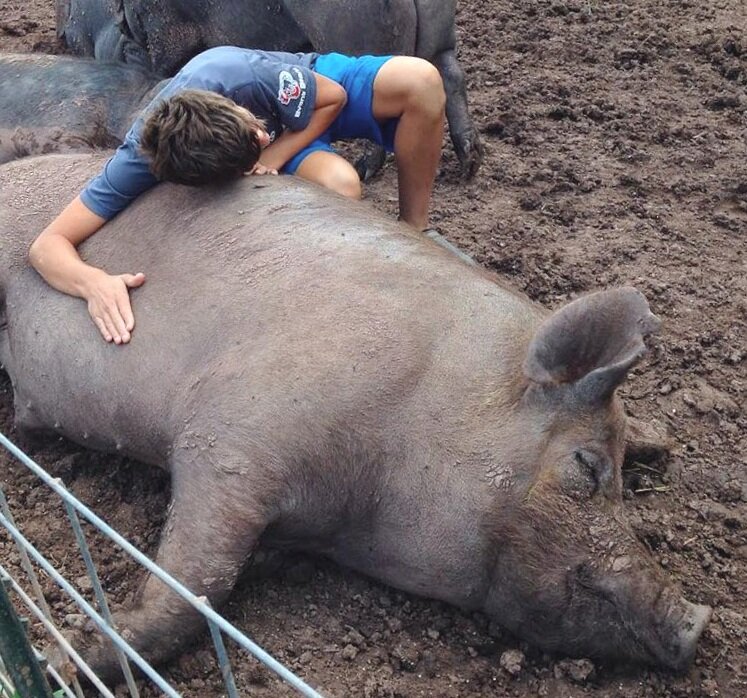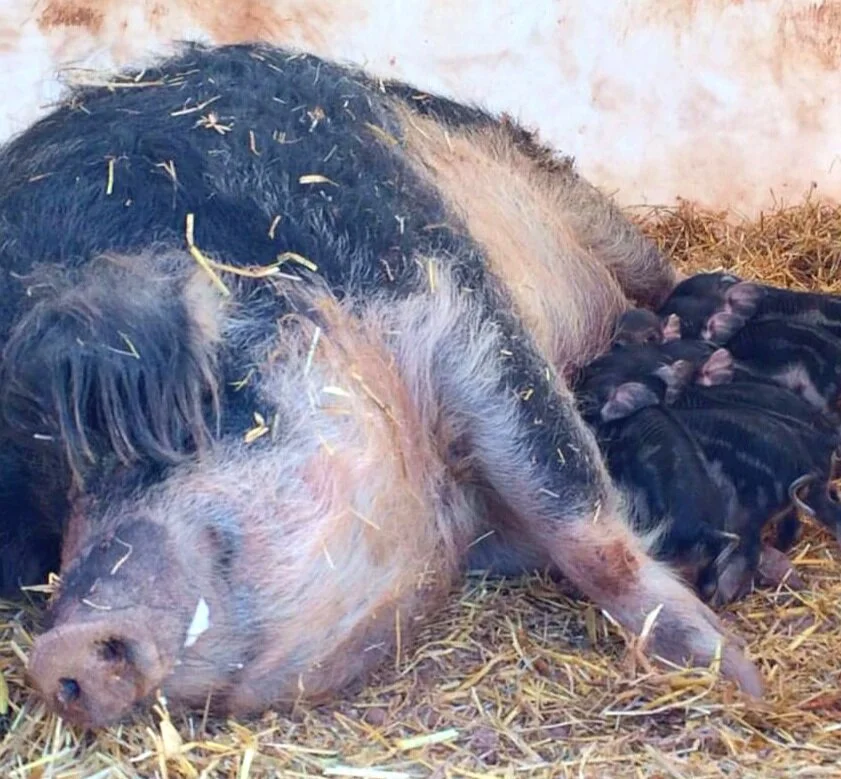Y-ker Acres grows happy pigs!
How do we do that? Provide them with a low-stress environment. They are pastured, which means they are outside 365 days a year. They have access to housing, fresh water, BIG wallows of mud, love, patience, good feed (we feed peas and barley plus all the pasture they can eat!), lots of loving scratches, conversations, strong animal husbandry skills, and did I mention LOVE?
Large Black piglets enjoying a treat of spaghetti squash.
Our Pigs
Our main goal is to provide our community with responsibly-raised food. So we chose specific breeds that we knew would flourish in our area. We wanted a pig that could handle the Minnesota winters and could benefit the soil by instinctively rooting. We chose to raise 3 heritage breeds, Large Black, Tamworth, and Mangalitsa.
Each have unique qualities specific to our chefs needs and desires for producing a high quality product. We also have been cross-breeding to get the “perfect pig” for Y-ker Acres. Years of breeding experience with having a competitive sled-dog kennel for 10+ years have set us up for great success.
Farmer Matt with one of our older Large Black Sows, Minnie.
Large Black
We fell in love with the droopy ears of the Large Blacks and their docile personality. Like their name, they have beautiful dark skin with durable, glossy black hair. Their ears cover their face. When you pull up their ears they have adorable wrinkles around their soft, brown eyes. They have a lower jaw that is narrow and have funny bottom teeth. Their bodies are long (they have an extra set of ribs) and have a droopy butt. The sows are excellent nest builders and take farrowing (birthing of piglets) very seriously. Because of their black color they love to lay in the sun in the winter and are quite hardy. They really like having their “buddies” close. They are quite stubborn, change is not their favorite thing. They don’t like being moved to a new pasture, they don’t like new neighbors, and they don’t like strangers feeding them. They are dedicated to the consistent people in their lives and they make us laugh.
Josey giving our Tamworth boar, Copper a BIG hug.
Tamworth
The Tamworth breed is a stocky, red pig with perky ears. They have coarse, thick hair that allows them to withstand our Minnesota winters. They are a playful breed that demands attention. Scratching behind their ears is their biggest joy. They like to chat with you and will look you straight in the eye. The sows are excellent mothers and can put up with very feisty piglets. Tamworths are an overall good-natured pig. Our boar, Big Bear, is a Tamworth. His name fits him perfectly ... he is BIG! He is a big baby that weighs over 900+ pounds. He has a BIG personality and a BIG heart.
Juno, our woolly mangalitsa, with her newly born piglets.
Mangalitsa
The woolly pig, the Mangalitsa is a fascinating breed. They look like a pig in sheep-wool clothing. They are the hardiest of them all. They often sleep in the snow and often farrow in the field. They are very close to a wild pig. They are so hairy, you can brush them! They LOVE to be brushed. Mangalitsa’s thrive in a forest setting and prefer the outdoors. They take a little longer to warm up to you, but when they do ... they demand your attention. The piglets are born with TONS of hair that look very similar to a wild boar with these beautiful stripes. Mangalitsa piglets are fast, independent, and stick very close to their mother. They love to explore and sometimes like to sleep in the tall grass which can make finding them hard!
If you enjoy eating meat ... eat responsibly and humanely-raised meat.
I’m sure all of you are thinking after reading these wonderful descriptions, “How can you harvest these pigs you have grown attached to?” Plain and simple ... it is hard. Very hard. We deal with life and death every day. It is a burden we take on as keepers of these magnificent animals. Know that our boars and sows live at our farm until they are older, so we get to enjoy their company for many years. We really strive for providing responsible meat for our community. In order to do that we raise pigs in a low-stress environment, make the harvesting process as stress-free and humane as possible, and give them a great life while they are here. That is why it is SO important to eat meat that is raised in these conditions. Meat that is raised locally. Meat that is raised by farmers that live in your community. That you can interact with, talk to, and ask questions. We made the decision to take on that responsibility of life and death so you don’t have to. That is why making a difference through small changes in YOUR LIFE makes a HUGE impact on you, your family, your community, the environment, and the world!
Trigger Warning: Disturbing Facts
Did you know the average number of pigs in a confinement farm is up to 2,500 pigs in one building. They live, eat, and sleep over a pit filled with urine and feces. Up to 10,000 pigs at each CAFO (Concentrated Animal Feeding Operation) is not uncommon.
Pigs are moved form CAFO to CAFO depending on their stage. Types of operations are gestation / farrowing, piggeries, growing, and finish. Imagine piglets being weaned from the sow as early as 14 days and transported hundreds of miles were they do not eat up to 48 hours?
Breeding sows spend 95% of their life in a crate, even during pregnancy (gestation crates). When giving birth they are moved to a farrowing crate. Piglets are removed from the sow at 2 to 5 weeks of age. The most common is 2 weeks. At Y-ker Acres piglets stay with the sow for 8–12 weeks.
Only 9 states have banned gestation crates. States include: Arizona, California, Colorado, Florida, Maine, Michigan, Ohio, Oregon, and Rhode Island. It is of note that among those not included on the list is Minnesota, Iowa, and North Carolina (the top 3 producers).
66 million pigs are produced each year in CAFO’s.
The average pig farm with 50% or more income coming from the sale of pigs went from 945 head of pigs in 1992 to 8,389 in 2009.
Farms with a “farrow-to-finish” philosophy (like our farm, where pigs are bred, born, and grown at the same place) went from 65% in 1992 to 18% in 2004, and is sadly now below 10%.
Minnesota is one of top 3 CAFO producers of pigs in the USA along with Iowa and North Carolina.
A pig raised in a CAFO can reach 250–275 lbs within 5 months. In contrast, it takes 7 to 8 months to reach 195–225 lbs at Y-ker Acres.
If you enjoy MPR and Splendid Table (I do!) You can listen to a broadcast on Factory Farms HERE.





